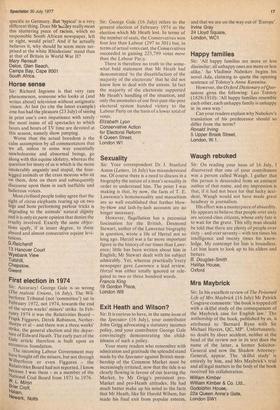First election In 1974
Sir: Accuracy! George Gale is so wrong (The realistic Unions, 16 July). The Wilberforce Tribunal (not `committee') sat in February 1972, not 1974, towards the end Of the seven weeks' miners' strike. In February 1974 it was the Relativities Board — Fra,nk Figgures, Derek Robinson, Netherthorpe et al — and there was a three weeks' strike, the general election and the departure of Edward Heath. The early part of the Gale article therefore is built upon an erroneous foundation. The incoming Labour Government may have bought off the miners, but not through Wilberforce or even Figgures — the Relativities Board had not reported. I know because I was there — as a member of the National Coal Board from 1971 to 1976. W. L. Won
Briar Croft, Halam, Newark, Notts
Sir: George Gale (16 July) refers to the general election of February 1974 as the election which Mr Heath lost. In terms of the number of seats, the Conservatives won four less than Labour (297 to 301) but, in terms of actual votes cast, the Conservatives succeeded in gaining 225,789 votes more than the Labour ParZy.
There is therefore no truth in the somewhat bald statement that Mr Heath had demonstrated `to the dissatisfaction of the majority of the electorate' that he did not know how to deal with the unions. ln fact the majority of the electorate supported Mr Heath's handling of the situation, and only the anomalies of our first-past-the-post electoral system handed victory •to the Labour Party on the basis of a lower total of votes.
Elizabeth Lyon Conservative Action for Electoral Reform 6 Queen Street, London W1


































 Previous page
Previous page